Search Results for 'turtle farm'
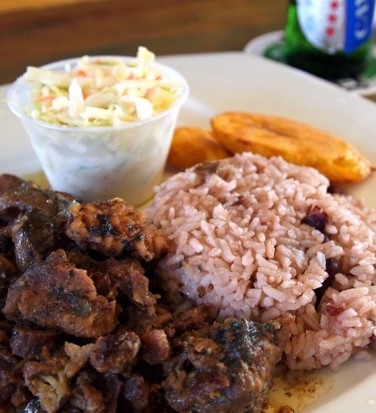
West Bay heritage day moves to Turtle Farm
 (CNS): In what is proving to be a very low key Pirates Week festival this year, after budget cuts and falling sponsorship appear to be cutting into the celebration, the Turtle Farm has taken over the West Bay heritage day. Normally held at the district’s Heritage Field, this year, the food vendors and local crafters will take over the farm Tuesday. The CTF is not releasing turtles as part of the festival this year after it acknowledged last year that releasing the farmed turtles may be a danger to the wild population. However, from 11am today the farm will be hosting pirates as well as local artisans and there will be a $5 charge which gets visitors a $5 food voucher.
(CNS): In what is proving to be a very low key Pirates Week festival this year, after budget cuts and falling sponsorship appear to be cutting into the celebration, the Turtle Farm has taken over the West Bay heritage day. Normally held at the district’s Heritage Field, this year, the food vendors and local crafters will take over the farm Tuesday. The CTF is not releasing turtles as part of the festival this year after it acknowledged last year that releasing the farmed turtles may be a danger to the wild population. However, from 11am today the farm will be hosting pirates as well as local artisans and there will be a $5 charge which gets visitors a $5 food voucher.
There will be music by local DJs as well as live entertainment by local performer “Lammy” and the West Bay district float will be on display, as well as a replica of a traditional catboat. Music and festivities will continue well into the evening, with a closing time of 2am. Guests will also be treated to a spectacular fireworks show.
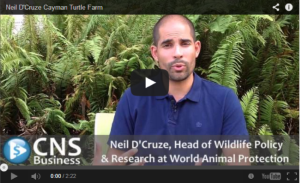
Former turtle farm provides example for CTF
 (CNS Business): A former sea turtle farm in the Reunion Islands in the Indian Ocean has successfully transitioned into a respected research centre where groundbreaking science is conducted but remains one of the islands' top tourist attractions. It also maintains the cultural heritage of the islands and their involvement with turtling, while continuing to employ people, according to Neil D’Cruze from World Animal Protection. See video
(CNS Business): A former sea turtle farm in the Reunion Islands in the Indian Ocean has successfully transitioned into a respected research centre where groundbreaking science is conducted but remains one of the islands' top tourist attractions. It also maintains the cultural heritage of the islands and their involvement with turtling, while continuing to employ people, according to Neil D’Cruze from World Animal Protection. See video
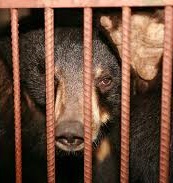
Turtle Farm not the sole focus of animal charity
 (CNS Business): World Animal Protection (WAP), the international animal charity that has been critical of the Cayman Turtle Farm, doesn’t just focus on issues surrounding the CTF but deals with a range of different animal welfare issues around the world, ranging from the terrible conditions of farm animals, assisting with disaster management, as well as wildlife issues. For over a decade WAP has been working towards ending the problem of bear farming in South Korea, in Vietnam and in China, where bears are kept in cages and their gallbladders are drained on a regular basis to produce traditional Asian medicine. Watch video on CNS Business
(CNS Business): World Animal Protection (WAP), the international animal charity that has been critical of the Cayman Turtle Farm, doesn’t just focus on issues surrounding the CTF but deals with a range of different animal welfare issues around the world, ranging from the terrible conditions of farm animals, assisting with disaster management, as well as wildlife issues. For over a decade WAP has been working towards ending the problem of bear farming in South Korea, in Vietnam and in China, where bears are kept in cages and their gallbladders are drained on a regular basis to produce traditional Asian medicine. Watch video on CNS Business

Turtle Farm hiding behind ‘conservation curtain’
 (CNS Business): The Cayman Turtle Farm claims to be a conservation facility but World Animal Protection (WAP) representative Neil D’Cruze says those claims may not be true and there may be an element of a “conservation curtain that is being hidden behind”. He said that the release of farmed turtles could be introducing disease to wild turtle populations. Watch video and comment on CNS Business
(CNS Business): The Cayman Turtle Farm claims to be a conservation facility but World Animal Protection (WAP) representative Neil D’Cruze says those claims may not be true and there may be an element of a “conservation curtain that is being hidden behind”. He said that the release of farmed turtles could be introducing disease to wild turtle populations. Watch video and comment on CNS Business
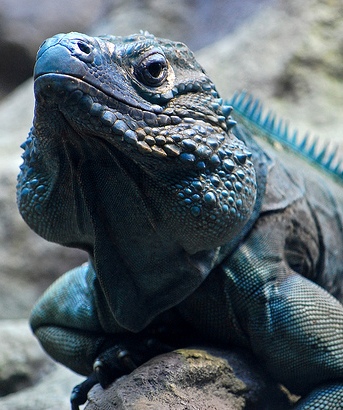
Turtle Farm says old age behind animal deaths
 (CNS): Concerns raised by a UK-based charity regarding the fate of animals other than turtles housed at the Cayman Turtle Farm had been dismissed by the management, which claims that a hybrid blue iguana died of old age and the deaths of five sandbar sharks were uncertain but may also have been due to age. The Farm said a remaining shark has been removed from the exhibit as the conditions do not suit sandbar sharks. Because it is not native to Cayman it cannot be released and may have to be put down. The CTF denied any problems at all with "Smiley", the crocodile, which was captured in the wild in 2006 by members of the public and given to the farm to recover from injuries it sustained when it was caught.
(CNS): Concerns raised by a UK-based charity regarding the fate of animals other than turtles housed at the Cayman Turtle Farm had been dismissed by the management, which claims that a hybrid blue iguana died of old age and the deaths of five sandbar sharks were uncertain but may also have been due to age. The Farm said a remaining shark has been removed from the exhibit as the conditions do not suit sandbar sharks. Because it is not native to Cayman it cannot be released and may have to be put down. The CTF denied any problems at all with "Smiley", the crocodile, which was captured in the wild in 2006 by members of the public and given to the farm to recover from injuries it sustained when it was caught.
In its latest report about the CTF and its aim to persuade Cayman to transition the facility from a turtle meat supplier to a fully-fledged conservation centre, the World Society for the Protection of Animals raised a number of questions about various other creatures the Farm houses as its wildlife exhibits.
The blue iguana hybrid, which the WSPA said had not been seen for several years, is dead, the Farm confirmed.
The management explained that the iguana was part of a hybrid pair with Sister Islands iguana ancestry. The male died in the wake of Hurricane Michelle, while the female lived on until 2011, when she was around 27 years old.
“Their normal lifespan is about 30 years,” the Farm said in response to questions from CNS about the WSPA concerns. “A necropsy was conducted by an exotic animal specialist veterinarian who had been overseeing her care for years. The necropsy revealed that the Blue died of natural causes – complications of old age. The BIRP (Blue Iguana Recovery Programme) and DoE (Department of Environemnt) were both notified of this.”
The CTF management noted that the Farm is currently caring for a Sister Islands iguana at the request of the Department of the Environment. That iguana was brought to the farm for rehabilitation and safe keeping, and it is now thriving in the iguana habitat.
Explaining that Smiley is not a caiman, as suggested by the WSPA, but a hybrid American crocodile that was injured when it was captured by members of the public, the CTF said the DoE asked them to care for Smiley during her recuperation. As she could not be returned to the wild, the Farm agreed to keep her permanently. She is kept in partial shade and partial full sun, fresh water and salt water sections, and is free to move between the sections as she pleases. The management said the crocodile jumps for her food as “part of the enrichment exercise”, which gives “her some mental and physical exercise simulating the species natural activity of leaping and pouncing to catch its prey.”
The situation with the sharks, however, remains in question and the Farm confirmed that five sandbar sharks have died. Vets were unable to determine the cause of death and had suggested it may be age-related. The remaining sandbar shark is in the Farm’s quarantine facility because this species of shark runs the risk of injury in the exhibit, which is an artificial reef and not a sandbar.
As these sharks are not native to the Cayman Islands, the last shark cannot be released into the wild so it may have to be “euthanized for humane reasons rather than risk repeated injury by being returned to the exhibit,” the Farm added.
The nurse shark that had an injury to its pectoral fin was also removed to CTF’s on-site quarantine facility, where it has been treated and has recovered.
“It is a type of injury thatoccasionally occurs in nature, especially during breeding season,” the Farm said, adding it was awaiting a decision by the vet about whether the shark should be returned to the exhibit.
See full answers from the Turtle Farm posted below regarding CNS questions based on the WSPA concerns, along with the charity’s report.
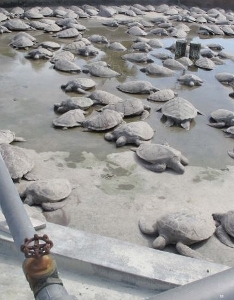
Charity steps up pressure for change at Turtle Farm
 (CNS): The World Society for the Protection of Animals launched a new report last week with the support of UK members of parliament, who are backing the charity’s call for a change to the Cayman Turtle Farm. The report details ongoing animal welfare issues and urges the transformation of the facility from farming to conservation. Highlighting what it calls the stimulation of turtle meat sales to tourists, it also questions the Farm’s conservation credentials as well as the environmental problems it creates and points to the significant subsidies from the public purse. However, the CTF said the report misrepresented the facts and denied selling meat to tourists, blaming local restaurants for creating that market.
(CNS): The World Society for the Protection of Animals launched a new report last week with the support of UK members of parliament, who are backing the charity’s call for a change to the Cayman Turtle Farm. The report details ongoing animal welfare issues and urges the transformation of the facility from farming to conservation. Highlighting what it calls the stimulation of turtle meat sales to tourists, it also questions the Farm’s conservation credentials as well as the environmental problems it creates and points to the significant subsidies from the public purse. However, the CTF said the report misrepresented the facts and denied selling meat to tourists, blaming local restaurants for creating that market.
The report, entitled "The Cayman Turtle Farm: A Continued Case for Change", was backed by Joan Walley MP, Chair of the UK Parliament’s Environmental Audit Committee, which has also raised concerns about the Farm in its own report, and Dr Matthew Offord MP, who hosted the report’s launch. The MPs spoke about their own concerns regarding the conditions at the Farm, which they both visited last year. The MPs are part of growing group that is pressuring the UK government to do something about what is considered a very controversial facility outside of Cayman.
Despite some advances made during its last visit, the charity detailed its ongoing concerns, pointing to the continuing husbandry and welfare problems, and emphasized the CTF’s stimulation of turtle meat consumption by visitors.
“While the true volume of Caymanian demand for turtle meat is unconfirmed, from 2010 to 2011, the Farm aimed to maintain production levels of turtle meat at 1,600lbs per week effectively anticipating a level of demand that has not been qualified. By also selling turtle meat to tourists, the Farm may spur a market for turtle meat that would not otherwise exist,” the WSPA stated.
The report also goes to the heart of claims made by the Cayman Turtle Farm that it is not just a butcher but that it has been central in conservation and research about turtles. It noted that of the 31,000 turtles released, 80% of which were tagged, only 13 have ever returned to Cayman beaches. Just 12 wild-caught and 31 captive-bred turtles produced viable eggs in 2012 from the many thousands of turtles held at the facility. It accuses the Farm of damaging the environment as a result of the untreated waste pumped directly into the sea, which is damaging the reefs and ocean water quality. The report also reminds readers of the more than CI$10 million per annum that the CTF sucks up in public subsidy.
Dr Neil D’Cruze, from WSPA, said the Farm is still failing to meet the welfare requirements of the 9,000 plus endangered turtles in its care.
“Some small changes have been made at the Farm, WSPA’s new report highlights that these simply do not go far enough. Add to this the potential negative impacts that the Farm has on wild sea turtle populations and marine biodiversity whilst also operating at a significant loss; it remains clear that the Cayman Turtle Farm must stop sea turtle farming,” he said, adding that the WSPA would continue to work with UK and Cayman Island politicians to demonstrate the need to transition the Farm into a turtle rehabilitation facility.
The Farm hit back and accused the charity of misrepresentation.
“What the WSPA is doing with this latest released report is merely a regurgitation of their previously stated claims, plus ongoing misrepresentation of facts to suit their aim to stop turtle farming by any means, ignoring long-standing local cultural traditions and displaying a reckless disregard for the truth.“
The Farm said the allegation that it is stimulating demand for turtle meat was the “most egregious fabrication” as the farm doesn’t sell turtle meat to tourists. “If local restaurants choose to serve turtle, which is a traditional cultural dish in the Cayman Islands, and tourists choose to patronise those restaurants – that is merely their choice in a free society,” it said.
The Farm also refutes allegations that it is overproducing and said it has over 500 individual customers and over 30 local restaurants. “The demand is real and immediate: almost all of the meat is sold fresh the very same day it is harvested,” the CTF said in a long release in response to the WSPA report. It said it was impossible to know how many Farm turtles had returned to Cayman but studies confirmed that turtles released from CTF migrated far and wide helping to increase the population of green sea turtles. It also said there had been a “huge upswing in the number of sea turtle nests in Cayman in recent years.
“There were approximately 20 Green sea turtle nests here in 2000, whereas in 2012 there were approximately 180: a nine-fold increase in the twelve year span,” as it took credit for that increase. Insisting that its existence prevents poaching, the Farm said the increase in sightings of sea turtles around Cayman was due to its own efforts.
Describing itself as Cayman’s number one land-based attraction, with over 200,000 visitors annually, it justified its gargantuan subsidy from the public, claiming it has a “positive macroeconomic impact” because it sustains hundreds of jobs in the local economy.
It also refutesclaims that the discharge is causing environmental harm, saying nearby reefs are fine and that the farm continues to operate under a proper Water Discharge Permit issued by the Water Authority.
“The WSPA is clearly interested only in telling a lopsided story to suit their agenda. WSPA representatives have given little credit to the strides that CTF has made in recent years in measures taken to ensure animal welfare, and they havechosen to ignore or refute the real conservation benefits of CTF,” a farm spokesperson stated. “The WSPA has not yet achieved its aim of stopping turtle farming in the Cayman Islands, so they are continuing their lobbying efforts and misleading sensationalism in order to strong-arm the UK Government, the Cayman Islands Government, the Cayman Turtle Farm, and the Caymanian people to get their way.”
The photo above was released to WSPA via an FOI request and shows how several hundred turtles were left to die when they were exposed to the sun in a waterless tank as a result of a pipe leak in 2012.
See statement from CTF below and full report from WSPA.
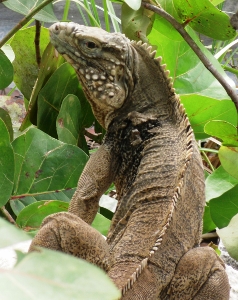
Rock iguana joins Cayman Turtle Farm menagerie
 (CNS): An endangered Cayman rock iguana from the Sister Islands has joined the eclectic collection of animals at the Cayman Turtle Farm as it awaits its potential return to the wild. The Cyclura nubila caymanensis was found, officials said, in Grand Cayman by the Department of Environment in April 2013 and was transferred to the care of the CTF in late May last year due to concerns over its failing health and the lack of appropriate resources at the DoE to rehabilitate the animal. Nursed back to health, the iguana, which is endemic to Cayman Brac and Little Cayman, is a cousin to the blue iguana.
(CNS): An endangered Cayman rock iguana from the Sister Islands has joined the eclectic collection of animals at the Cayman Turtle Farm as it awaits its potential return to the wild. The Cyclura nubila caymanensis was found, officials said, in Grand Cayman by the Department of Environment in April 2013 and was transferred to the care of the CTF in late May last year due to concerns over its failing health and the lack of appropriate resources at the DoE to rehabilitate the animal. Nursed back to health, the iguana, which is endemic to Cayman Brac and Little Cayman, is a cousin to the blue iguana.
Also an endangered species, it is highly threatened on Cayman Brac but more abundant on Little Cayman, though the smaller island's population is still vulnerable and continuously threatened by development, road kills, and free-roaming cats and dogs. The species is both internationally and locally protected.
On loan to the Cayman Turtle Farm, the female is currently housed in the iguana enclosure located just outside of the park’s Caribbean free-flight Aviary. Since taking up residence at the farm she has been nursed back to primehealth and has also undergone DNA analysis to confirm her identity and island origin. This is part of a DNA analysis study carried out by a student at the Mississippi State University under the supervision of Dr Mark Welch, a specialist in Cyclura species genetics.
Although the student’s results indicated that the iguana is a Sister Islands rock iguana, a larger DNA analysis is currently underway to see if each island has its own unique population. The DoE recommended that the iguana remains with the Cayman Turtle Farm pending the imminent results of the larger genetic analysis and then a final health screening, prior to release.
In the meantime, this particular iguana offers an educational opportunity and the Cayman Turtle Farm’s curator of terrestrial exhibits and education programmes, Geddes Hislop, is working closely with the DoE to ensure that the iguana is appropriately cared for and part of an education programme centered on the species.
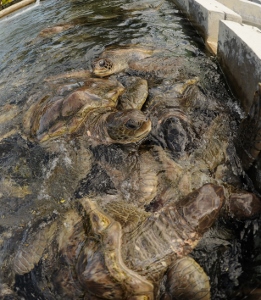
Turtle farm should downsize
 (CNS): A report commissioned by the Cayman Turtle Farm to measure its own impact on the Cayman Islands' economy has recommended that the facility downsize. The report, which was conducted in May last year by PricewaterhouseCoopers and released on Friday, points out that the farm is very unlikely to ever become profitable without a massive increase in visitor numbers and it should scale back its operations. The consultants said their research indicated that a reduction in scale wouldn’t hurt existing visitor numbers but would help reduce overheads and reduce losses. Although the report has indicated the CTF does have some benefits, such as the employment of around 90 people, most of whom are local, and remains Cayman’s most popular land-based attraction, it has little hope of breaking even.
(CNS): A report commissioned by the Cayman Turtle Farm to measure its own impact on the Cayman Islands' economy has recommended that the facility downsize. The report, which was conducted in May last year by PricewaterhouseCoopers and released on Friday, points out that the farm is very unlikely to ever become profitable without a massive increase in visitor numbers and it should scale back its operations. The consultants said their research indicated that a reduction in scale wouldn’t hurt existing visitor numbers but would help reduce overheads and reduce losses. Although the report has indicated the CTF does have some benefits, such as the employment of around 90 people, most of whom are local, and remains Cayman’s most popular land-based attraction, it has little hope of breaking even.
Without the more than $9 million subsidy from government, more than half of which goes to pay off the outstanding loan from the redevelopment of the facility, the CTF would be forced to close.
In the impact study PwC suggests that the farm could have a greater chance of holding its own if government went ahead and built the berthing facilities in George Town or if it were to find some other way of massively increasing its share of visitors. More than 70% of visitors to the Farm are cruise passengers and mostly from Carnival and Disney ships.
However, its share of the cruise visitors has declined dramatically over the last five years by some 50%. Although cruisepassenger numbers have fallen over the same period by around 12%, the consultants found that the fall in the Farm’s share of guests could not be attributed solely to the drop in ship calls but the increase in ticket price. It also reveals that the cruise lines have a 50% mark-up on the trip package they sell to cruise visitors which includes the CTF.
In the report, which cost the CTF US$32,000 to commission, PwC created various scenarios where it measured the Farm’s economic impact compared to its government subsidy and found that it has some benefits to the tourism economy. Pointing to its conservation efforts, its employment of locals and its attraction as part of a package of land-based tours, the consultants found it was worth around $40 million over 15 years. With the cruise berthing facility, PwC’s research indicates that could increase, but the consultants warn that the Farm’s heavy dependence on cruise visitors makes it vulnerable.
Although seen as an important part of the package of attractions, the consultants warn that the CIG needs to begin thinking about more attractions if it is to make the berthing worthwhile and there are still no guarantees that the CTF will ever become profitable.
When it assessed the Farm’s position, PwC also considered the conservation efforts, including the turtle release programme, which has since been suspended for at least three years as research work is being undertaken to measure the release impact on the turtle population and the potential dangers to wild turtles.
PwC does suggest, however, that stopping the subsidy altogether would cause further losses for government as closing the farm would take twelve months and government would still have to pay the loan.
Ever hopeful that the Farm still has a future as an attraction and not just as a supplier of local meat, Tim Adam, the managing director of the facility, said in a release that with government going ahead with the cruise berthing facilities, the Cayman Turtle Farm would be able to increase its visitor numbers significantly.
“The key numbers show that, especially in the scenario of having cruise berthing facilities, there are large economic benefits from the government subsidy to enable CTF to continue operating and having the positive net impact on the wider economy and employment in Cayman. In addition, CTF also provides other benefits in its role in conservation and maintaining our Islands’ cultural and social traditions,” he said.
See the full report below.
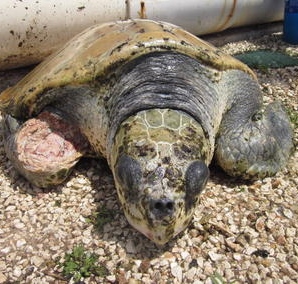
Science journal details turtle farm cruelty
 (CNS): Animal welfare issues relating to the Cayman Turtle Farm (CTF) have been detailed in a scientific report published Friday in the Journal of Agricultural and Environmental Ethics. The report points to the physical injury, disease and abnormal behaviour of turtles at the farm observed by the authors, based on evidence provided by the World Society for the Protection of Animals, a site inspection and research. The findings point to physical and behaviour problems of the sea turtles at the farm being “indicative of problematic management and captivity-related stress,” which the scientists said demonstrated the limitations of turtles to adapt to captivity.
(CNS): Animal welfare issues relating to the Cayman Turtle Farm (CTF) have been detailed in a scientific report published Friday in the Journal of Agricultural and Environmental Ethics. The report points to the physical injury, disease and abnormal behaviour of turtles at the farm observed by the authors, based on evidence provided by the World Society for the Protection of Animals, a site inspection and research. The findings point to physical and behaviour problems of the sea turtles at the farm being “indicative of problematic management and captivity-related stress,” which the scientists said demonstrated the limitations of turtles to adapt to captivity.
The WSPA, which is continuing its campaign to persuade the CTF to change to a conservation facility, said the report, entitled "Welfare and Environmental Implications of Farmed Sea Turtles", presents a major challenge for the managers of the Cayman Turtle Farm, who had committed to improving conditions for what are now estimated to be around 9,500 turtles in their care.
The report was written by three specialised reptile biologists: Phillip Arena of Murdoch University, Catrina Steedman of the Emergent Disease Foundation, and Clifford Warwick, a London-based biologist and medical scientist who was recently offered the post of Fellow at the Oxford Centre for Animal Ethics in recognition of his long career and scientific contributions to reptile welfare and conservation.
“The problematic physical and behavioural signs, in our view, related to the inherent nature of intensive turtle propagation which in particular involves overt- and crypto-overcrowding and under stimulating environments, and an associated failure to meet all the physical, biological and innate behavioural needs of sea turtles,” the authors said in the conclusions about the farm.
The animal welfare charity WPSA said the report tallies with their results following the controversial undercover investigation conducted over a year ago that documented the extent of problems at the Farm, which the CTF has been at pains to deny. However, this latest scientific report also contradicts the farm management’s claims following its own assessment inspection in December, when the farm said there was no strong evidence for WSPA’s concerns about animal welfare.
Talking about the work of the scientists, one of the authors, Clifford Warwick, said that the detailed evidence- based research into farming practices at the farm has highlighted a range of physical and behavioural problems, some of which are extremely serious.
“In our view, these concerns are unresolvable, the Farm simply cannot replicate the turtle’s natural habitat, nor can it meet their biological needs within a captive environment. Also, the transmission of potentially dangerous pathogens from the turtles to the visiting public continues to represent a significant health risk,” he said, adding that the recent changes instituted by the CTF did not alter any of these concerns.
The WSPA campaign to persuade the management to transition the facility away from farming towards conservation continues and has drawn support from over 180,000 people worldwide, as well as a host of animal welfare and conservation organisations. The campaign leader for WSPA, Dr Neil D’Cruze, said the report documents physical and behavioural problems among the marine animals consistent with animal cruelty, which is extremely worrying.
“Despite WSPA raising concerns over a year ago, this new scientific report shows that the turtles are still suffering,” he said. “WSPA has met with the new Caymanian Government and had open and candid talks to ensure that positive steps are taken to help the thousands of sea turtles which continue to suffer at the Cayman Turtle Farm. We hope the new government will learn from the errors of its predecessors and ultimately see that the long term solution for the Cayman Turtle Farm is to become a turtle rehabilitation and release facility,” the charity leader added.
The Turtle Farm has been battling the fallout from the bad publicity since the WSPA’s report went public in October last year. It comes at a time when public attention on the farm has also focused on the massive almost $10 million subsidy provided to the facility every year from an increasingly tight public purse.
Despite the major issues, the CTF enjoyed a bumper year this breeding season and recently cut the price of meat as a result of the increase in production. The farm has also claimed a number of improvements in the conditions and it has now employed a full time vet.
Responding to the latest report on Friday, the CTF seemed unconcerned and said the findings were a rehash of the previous WSPA report. It accused the charity of trying another publicity attack with what it said was more WSPA-sponsored research.
“This latest article really isn’t saying much of anything the WSPA hasn’t already said before,” said Tim Adam, Managing Director of CTF. “It repeats the same allegations the WSPA made previously citing the same authors, and basically comes across as just another effort by the WSPA to force the Cayman Turtle Farm and the CI Government to completely change the operating model of the CTF since the WSPA campaign has thus far been unsuccessful in achieving that aim.”
Adam said the charity wants to stop turtle farming, stop a legal source of meat, stop public interaction with turtles, and stop the release programmes.
“Apparently the WSPA has sponsored yet another report hoping it will help them achieve those objectives,” he said, insisting that the farm had been vindicated by it's own inspection last year, despite the extensive photographic evidence of the scientists’ findings to the contrary, and that the turtles were in good shape.
“At the Cayman Turtle Farm we are committed to the health, safety and well-being of both our guests and our animals and we continue to strive for the highest standards in all the key aspects of the work we do – sea turtle reproduction and husbandry, conservation, display and education,” Adam said. “The independent inspection of our operations confirmed the validity of our research and conservation work, and also highlighted areas for improvement. We have worked hard since the publication of the inspection report to address the issues raised by the independent inspectors, and we strive for continued improvements.”
Adam dismissed the latest findings as the same accusations. “We are frankly disappointed that the WSPA continues to repeat their same accusations about the Cayman Turtle Farm in order to damage our reputation and impede our work,” he added.
See full scientific report here.
See CTF full release below.
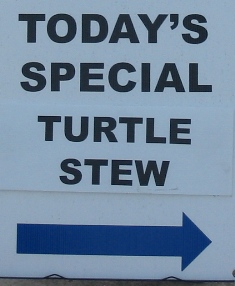
Wildlife charity hopeful for turtle farm change
 (CNS): A spokesperson for the World Society for the Protection of Animals said it had a cordial and realistic meeting with the new government this week when two of its members came to discuss the issues regarding the increasingly controversial and costly turtle farm. Although the WSPA and the CIG remain divided on the substantive issue of breeding turtles for meat, Neil DaCruz said that both he and CEO Mike Baker enjoyed a more positive meeting with the new Cabinet, who listened to some of the proposals to address the myriad issues at the Farm. Although no agreements have been reached, the activists believe that the CIG is keen to make changes that would stop the facility draining $10 million from the public purse each year.
(CNS): A spokesperson for the World Society for the Protection of Animals said it had a cordial and realistic meeting with the new government this week when two of its members came to discuss the issues regarding the increasingly controversial and costly turtle farm. Although the WSPA and the CIG remain divided on the substantive issue of breeding turtles for meat, Neil DaCruz said that both he and CEO Mike Baker enjoyed a more positive meeting with the new Cabinet, who listened to some of the proposals to address the myriad issues at the Farm. Although no agreements have been reached, the activists believe that the CIG is keen to make changes that would stop the facility draining $10 million from the public purse each year.
Numbers at the Cayman Turtle Farm are believed to have reached 9,000 animals but the facility it is still haemorrhaging cash. In the emergency interim budget passed in the LA last month following the election, the finance minister was forced to allocate CI$2.5 million to support the farm.
DaCruz said that the new minister for the environment, the director of the DoE, the environmental health minister, the minister for planning and the tourism minister met with him and Baker this week and were prepared to discuss some of the problems.
“We have opened a more positive channel of communication, and while we understand the fundamental issue of supplying the local population with meat is not going to be discussed at this stage, the new government listened and discussed some of the other issues, such as handling, husbandry, the numbers and the head start programme,” Da Cruz said.
The activist said that at this stage the WSPA understands that the need to breed meat for the local population was not something that they expected would be a matter for discussion. But, he said, government was willing to listen to ideas about reducing the numbers of turtles held at the facility and was open to consideration about the release programme and whether that was the best way to help with the conservation of wild turtles.
The activists have proposed that the CIG examine the market for meat and separate the local demand from that of tourists, which is believed to be very small in comparison, and perhaps introduce a ban on the sale of meat to visitors.
Da Cruz said that for the first time the WSPA were not simply dismissed as agitators and that their concerns were listened to, especially as the government is also looking for a way to address the problems at the facility.
While changing the cultural position on allowing the local consumption of meat may be some time away, DaCruz and Baker are hopeful of improving current husbandry conditions, reducing the numbers at the farm and a review of the farm’s release programme, known as head starting, he said.
The WSPA published a damning report about conditions at the CTF last year, whichstirred up considerable controversy when documentary evidence of poor conditions at the facility were dismissed. The report also came in the wake of the loss of hundreds of turtles due to technical problems. Despite photographs showing evidence of cannibalism, disease, birth defects polluted water and overcrowded conditions, the CTF went on the defensive and attacked the activists rather than addressing the fundamental problems at the farm. Although the farm pressed its conservation credentials and undertook its own report, which led to some positive changes, many of the concerns raised by the WSPA remain.
Related article on CNS: